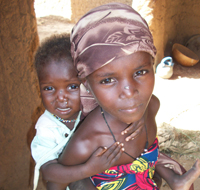- Feature #1 - Feature #1 Description Here.
- Feature #2 - Feature #2 Description Here.
- Feature #3 - Feature #3 Description Here.
Neglected Tropical Diseases (NTDs) are a group of parasitic and bacterial diseases that cause substantial illness for more than one billion people globally. Affecting the world's poorest people, NTDs impair physical and cognitive development, contribute to mother and child illness and death, make it difficult to farm or earn a living, and limit productivity in the workplace. As a result, NTDs trap the poor in a cycle of poverty and disease.
Neglected Tropical Diseases Topics
Diseases
Guinea Worm, Lymphatic Filariasis, Onchocerciasis...
Global NTD Programs
Global control efforts...
CDC's Role
How CDC works to prevent, control and elminate NTDs...
References & Resources
Resources, publications, manuscripts, partners...
Fast Facts
- 100% of low-income countries are affected by at least five neglected tropical diseases simultaneously
- Worldwide, 149 countries and territories are affected by at least one neglected tropical disease (NTD)
- Neglected tropical diseases kill an estimated 534,000 people worldwide every year
- Individuals are often affected with more than one parasite or infection
- Treatment cost for most NTD mass drug administration programs is estimated at less than US fifty cents per person, per year
About NTDs

More than 1 billion people—one-sixth of the world's population—suffer from one or more Neglected Tropical Diseases (NTDs).
NTDs are a group of infectious diseases that are the source of tremendous suffering because of their disfiguring, debilitating, and sometimes deadly impact. They are called neglected because they have been largely wiped out in the more developed parts of the world and persist only in the poorest, most marginalized communities and conflict areas.
Social stigma is a major consequence of NTDs. In addition to causing physical and emotional suffering, these devastating diseases hamper a person's ability to work, keep children out of school, and prevent families and communities from thriving.
Image: Nigerian children at-risk of infection with NTDs. Credit: CDC photo, Sonia Pelletreau.
Contact Us:
- Centers for Disease Control and Prevention
1600 Clifton Rd
Atlanta, GA 30333 - 800-CDC-INFO
(800-232-4636)
TTY: (888) 232-6348
24 Hours/Every Day - cdcinfo@cdc.gov


